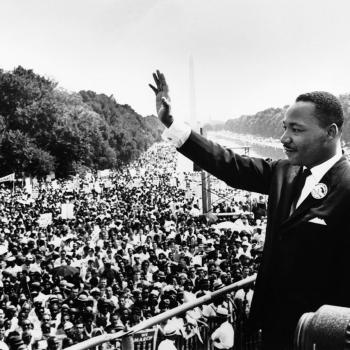The Gospel According To St. Matthew (1964)
Directed by Pier Paolo Pasolini: Simply the best of all the life of Jesus films.
Grand Illusion (1937)
Directed by Jean Renoir: One of the great antiwar films, Grand Illusion illustrates the brotherhood of all mankind. Yet as Renoir presents a constant play of divisive boundaries -- of class, of race, of sex -- all of which can be broken down, he also shows how our fallen human nature reconstructs them. Thus as sexual barriers tumble in the all-male musical revue, national ones are erected when the cast stops the show to sing "The Marseillaise." Complex and profound, this film contains great performances by Jean Gabin, Pierre Fresnay, and Eric Von Stroheim.
The Grapes Of Wrath (1940)
Directed by John Ford: Ford improved on Steinbeck and translated his sometimes didactic and heavy-handed writing into a great humanist work. It achieves what so many works of art in the '30s aspired to: the raising of the workingman to heroic dignity. Instead of the all-too-common stereotyping and abstraction of the period, Ford invests each character with his or her unique individuality. Is it an accident that the most effective left-wing film of the decade, if not the century, was made by a Catholic?
Groundhog Day (1993)
Directed by Harold Ramis: Groundhog Day reverses the proposition of Ikiru. Instead of being informed that he will soon die, the protagonist, Bill Murray, a nerdy, narcissistic, condescending Pittsburgh TV weatherman, discovers that he cannot die, that he is trapped, seemingly forever, in February 2nd, Groundhog Day, in Punxsutawney, Pennsylvania, the site of the National Groundhog Festival. Murray, sent to cover this event, must continually relive it until such immortality as this provides him teaches him how to be mortal. Like the hero of Ikiru, Murray tries out, in a comical manner, the worldly pleasures of indulgence, sex, and money, and when they do not work, he turns to despair. But after hundreds if not thousands of attempts either to live a fun day or annihilate himself, he begins to sanctify the time. Whereas Jimmy Stewart in It's a Wonderful Life discovers what Bedford Falls would have been like had he never lived, Bill Murray discovers how Punxatawney can be turned into a better place. I do not know the religious affiliation of Danny Rubin, the writer of this film, but I do know that his picture embodies the message taught and lived by many saints.
Ikiru (1952)
Directed by Akira Kurosawa: An older bureaucrat discovers he has terminal cancer, and in the last six months of his life also discovers how to live, which is what "ikiru" means in Japanese. The first half of the film shows his journey toward the truth; the second half, at his funeral, shows through flashbacks what happened when he found it. In case you don't already know, the truth is to love your neighbor. If only one film of the 20th century could survive, this would be my choice.
It Happened One Night (1934)
Directed by Frank Capra: The original "screwball comedy," it belongs on the best fifty list of films of any category. Like so many class-conscious pictures of the '30s, it reconciles the "screwball" rich with the common people. It also reconciles father and daughter. Best of all it tames a spoiled brat (Claudette Colbert) and cuts down to size a self-centered male chauvinist (Clark Gable) and fits them both for a lasting marriage. One of the few films that actually deserved all its Academy Awards.
It's A Wonderful Life (1946)
Directed by Frank Capra: If any film can top It Happened One Night, this is it. Seldom has the pope's favorite theme of the importance of each person's life been so effectively dramatized. Perceived when it was released as too sentimental, it has taken its place as one of the most profound and beloved films of all time. Joseph Walker, the great cinematographer, filmed this so beautifully in black and white that it is a sin to watch the tacky colorized version.
The Last Supper (1976)
Directed by Tomas Gutierrez Alea: Unlike The Seventh Seal, which looks Christian on the surface but is actually existential, The Last Supper looks existential but is actually Christian. In it the great Cuban director Gutierrez Alea, who gave us Memories of Underdevelopment and Up to a Certain Point, presents an anatomy of slavery in 18th-century Cuba. When an enlightened and pious aristocrat attempts to celebrate the Last Supper with his slaves, all chaos breaks loose. Though on the one hand the film exposes the hideous relationship between the class system and the religious establishment, it also reveals Christianity as the true basis for human freedom.




